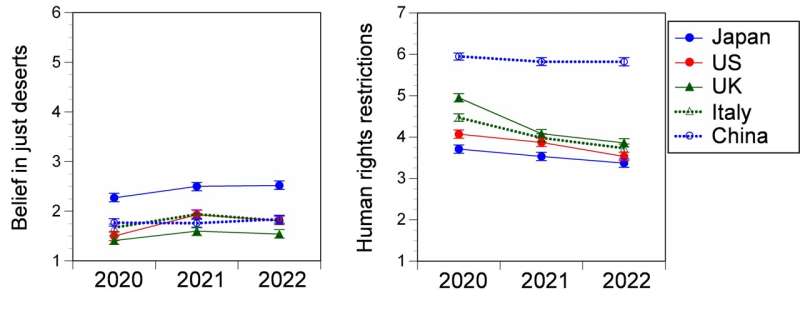This article has been reviewed according to Science X's editorial process and policies. Editors have highlighted the following attributes while ensuring the content's credibility:
fact-checked
peer-reviewed publication
trusted source
proofread
Blame and compliance: Study explores how disease-related discrimination varies across countries

What is a public health issue? Disease outbreak, malnutrition or reproductive health might come to mind. One global issue that one might not think of, however, is discrimination; in particular, discrimination in times of disease outbreak or pandemic. Now, a Japan-based team of researchers has explored how this disease-related discrimination varies across countries.
Such discrimination has long been part of the human experience; for example, Jewish people were widely discriminated against during the infamous plague pandemic of the 14th century. Centuries later, disease-related discrimination continues to exist, and has been widely observed during the coronavirus (COVID-19) pandemic. This discrimination can be based on various things, such as ethnicity or occupation.
"In several countries, such as the United States and Japan, there were groups of people who saw themselves as 'local vigilantes' or 'advocates for health' and demanded strict infection control measures from other people," explains lead author Michio Murakami. "To better understand social dynamics during times of disease outbreak, we wanted to further explore patterns in such thinking across countries."
The study, published in PeerJ, focused on two common psychological factors: belief in just deserts (BJD), defined as a person's belief that an infected individual deserves to be infected, and human rights restriction (HRR), defined as how much an individual agrees with government restrictions on citizens' behavior during emergencies or pandemics.
In a 2020 survey, BJD regarding individuals infected with COVID-19 was observed to be higher in Japan than other countries. In this study, the annual trends of BJD and HRR were examined in five countries from 2020 to 2022: Japan, United States (US), United Kingdom (UK), Italy, and China.
Results showed that, again, BJD was highest in Japan , while it was lowest in the UK. BJD increased in all countries except China from 2020 to 2021. Meanwhile, HRR was highest in China and lowest in Japan; HRR decreased in Japan from 2020 to 2021 and decreased in the US, UK and Italy from 2020 to 2022.
Interestingly, in Japan and Italy, BJD and HRR were positively correlated with each other, i.e., HRR was lower in people with low BJD and higher in people with high BJD.
"People with low BJD do not necessarily believe that an infection is caused by a victim's behavior, and thus may not necessarily believe a victim should be punished," explains senior author Asako Miura. "At the same time, people with high HRR strictly follow rules and tend to believe that those infected did not follow the rules, which could lead to increased BJD."
These findings are not only interesting but could also help to reduce discrimination during times of disease outbreak. For example, government-led public messages for high-HRR individuals could be employed to reduce BJD and thereby reduce disease-related prejudice and discrimination.
More information: Michio Murakami et al, Differences in and associations between belief in just deserts and human rights restrictions over a 3-year period in five countries during the COVID-19 pandemic, PeerJ (2023). DOI: 10.7717/peerj.16147


















